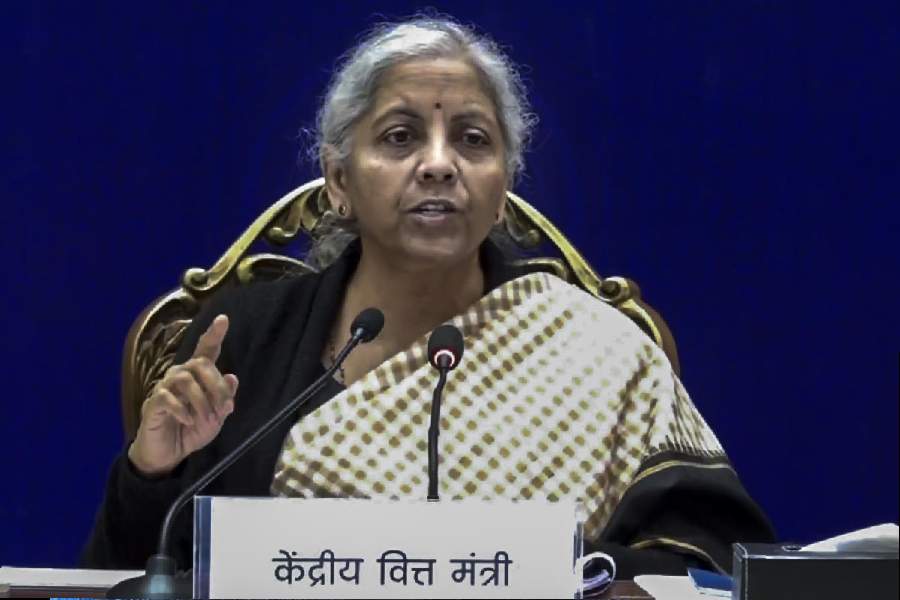The Goods and Services Tax (GST) Council on Saturday deferred several key decisions, including rate reductions for health and life insurance premiums and a comprehensive rejig of GST rates on 148 items.
The 55th meeting of the council, chaired by finance minister Nirmala Sitharaman, also saw states blocking a move to bring aviation turbine fuel (ATF) under the GST framework.
The council held off lowering GST rates for health and life insurance premiums, pending inputs from the Insurance Regulatory and Development Authority of India (IRDAI).
Sitharaman clarified a Group of Ministers (GoM) will review these proposals but offered no timeline for their conclusion.
Similarly, a decision on reducing GST rates for food delivery platforms such as Swiggy and Zomato was postponed, with the fitment committee tasked to revisit the issue.
The much expected report from GoM on rate rationalisation, which could impact 148 items, was not presented during the meeting.
Bihar deputy chief minister Samrat Chaudhary, who heads the GoM, said further deliberations were required, with the group expected to reconvene in January.
“The council failed to meet expectations on several fronts,” said Shivam Mehta, executive partner at Lakshmikumaran & Sridharan Attorneys.
“Key matters such as rate rationalisation, insurance tax cuts, and the inclusion of ATF under GST remain unresolved. Even decisions on municipal charges for granting floor space index or food aggregator tax rates have been postponed.”
As the GST Council defers critical reforms, industry leaders and policy makers alike turn their attention to upcoming meetings, where unresolved issues are set to take centrestage.
Payment aggregators handling transactions under ₹2,000 were granted GST exemptions. Sitharaman clarified, however, that the exemption does not extend to payment gateways or other fintech services unrelated to fund settlements.
The council approved a reduction in GST for fortified rice kernels used in public distribution schemes, slashing the rate from 18 per cent to 5 per cent.
Meanwhile, the tax rate on the sale of used electric vehicles by businesses was increased to 18 per cent from 12 per cent, aligning with rates for non-electric vehicles.
This adjustment applies only to the margin — the difference between the purchase price and selling price — when claimed for depreciation.
Analysts expressed concerns about the potential impact of this hike on the nascent pre-owned EV market.
“The GST rate increase could reduce the appeal of second-hand EVs, slowing demand in a sector still in its infancy,” said Sivakumar Ramjee, executive director, indirect tax at Nangia Andersen India.
States unanimously opposed bringing ATF under the GST framework, citing discomfort with potential revenue impacts.
ATF, along with crude oil, petrol, diesel and natural gas, remains outside the GST regime, with states continuing to levy VAT and the central government imposing an excise duty.
The council announced exemptions on penal charges collected by banks and NBFCs from borrowers for non-compliance with loan terms. It also agreed to simplify GST registration processes for small businesses, with necessary amendments to be proposed in future meetings.
A new GoM was formed to explore allowing states to levy a cess under GST for financial distress caused by natural calamities. Finance ministers from Uttar Pradesh, Telangana and Bengal will serve on the panel.
Experts weighed in on the council’s decisions, highlighting both progress and areas of concern.
M.S. Mani, partner at Deloitte India, emphasised the need for timely decisions on insurance and rate rationalisation, noting that businesses require adequate preparation time for changes.
“It is necessary to establish reasonable limits for lower rates, considering significant healthcare cost increases,” he said.
Saurabh Agarwal, tax partner at EY India, welcomed exemptions for life-saving medicines and fortified rice but flagged issues such as the exclusion of payment gateways from small transaction exemptions and unresolved GST treatment for food delivery and cab aggregators.
The Council also approved a proposal to implement ‘Track and Trace Mechanism’ for specified evasion-prone commodities, under which a unique mark will be affixed on such goods or packages to trace them throughout the supply chain.
An enabling provision in CGST Act, 2017 through Section 148A will be inserted to empower the government.










